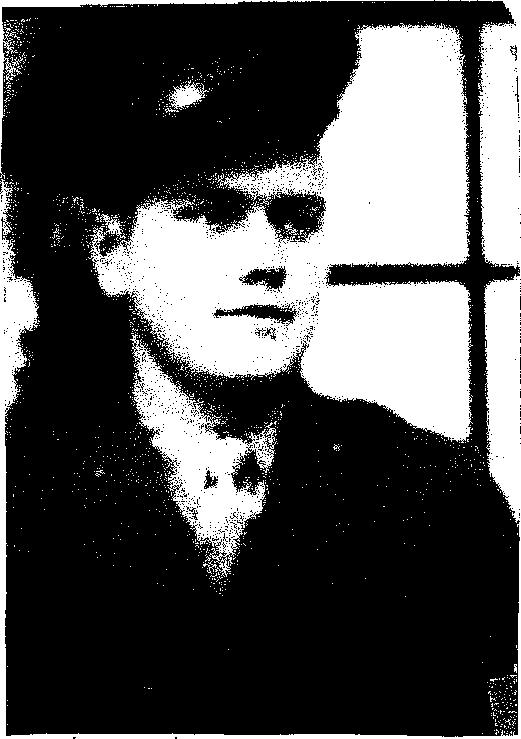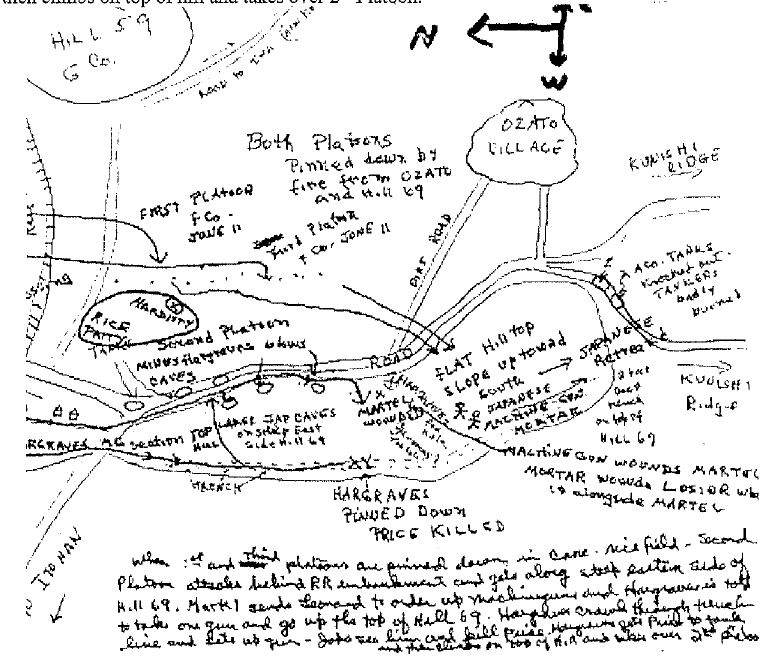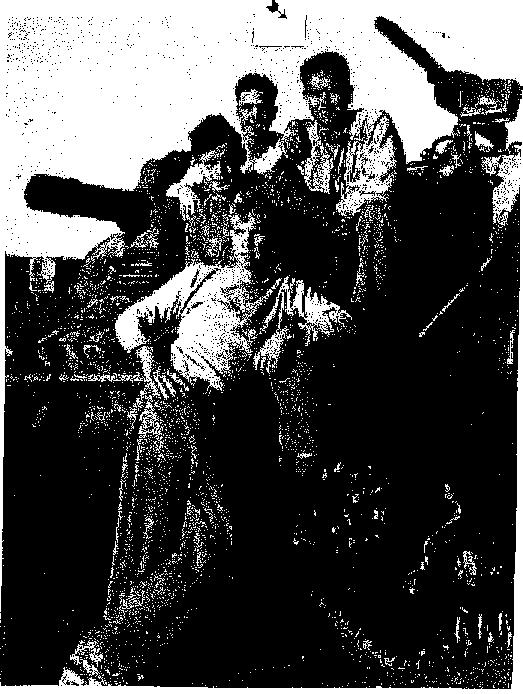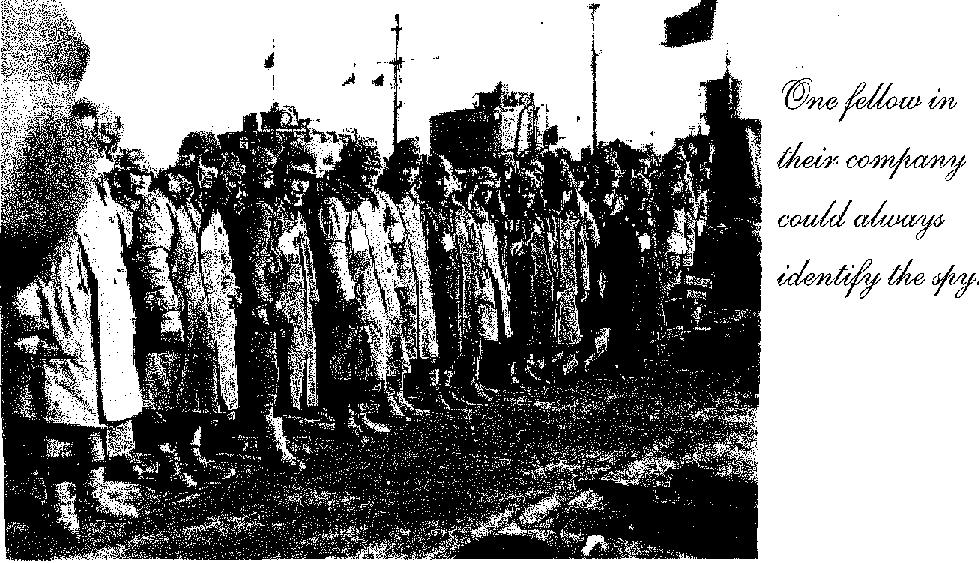
|
|
PAUL HARDISTY
as told by his son, Marvin
Paul Hardisty grew up on a farm in Adams County, Iowa. At that time it was customary for the boys to quit school at 8th grade if they were needed to help with farm work, so Paul had only seven years of schooling — seven, not eight, because he "passed over" sixth grade. That, too, was customary if a student completed two grades within a year.
Paul enlisted in the United States Marine Corps at the age of 18. He and Evelyn Stalder were married when he came home on leave during his training. Paul was a machine gunner in Fox Company of 280 men (boys) who served in the Pacific. He is deceased now, and his story is pieced together by Marvin's recollections, newspaper clippings and pictures. A main source of information is a newspaper report of the Fox company's reunion: |
|
"Fox Company is an oddity in itself. Members and probably not more than two or three other units this small still hold reunions. Division reunions are commonplace. Ditto bomb group and ship reunions. But a small unit get-together like this is a rarity and how did they find each other? That in a sense is somewhat macabre, but indicative of the common sense of enlisted men. Someone had held onto a list that was common but looked upon as anathema, a list of next of kin to be notified in case a Marine was killed or wounded. 'We wrote those addresses,' said Dale Decker, a truck-line owner from Fort Dodge, Iowa. The guys in a lot of cases had moved on but relatives were still around. The reunions have always been here (in Branson). It is centrally located and wives like the shopping and entertainment.
"The shows and bargains are a long way from Fox Company and its sobering statistics. Half the company including the replacements died in the Pacific. Half! An example: When Peleliu was finally secured in late September 1944, only 13 men of Fox Company were still standing of the original 280 who had landed. Historians later concluded that Peleliu was not essential to success in the Pacific War. Cold comfort to the first Division. Those are the hard memories, ones not dwelled on at reunions. That is past.
"What was recalled were the little things. 'We were just kids,' said Al Wilson, a native Kansan, who now lives in Shawnee on Delaware, Pennsylvania. 'Full of vinegar on Guadalcanal we had a kid from Mississippi whose name — and I'm not kidding, was Genevieve Wilson, had a brother named Judy. Said he and his brother had to fight all the time as kids. Anyway, we called Genevieve 'chicken.' He was a heck of a BAR (Brown Automatic Rifle) man although the thing weighed 24 pounds and Chicken would have been lucky to make 95 pounds ringing wet." You know how old he was? 14. That's right, 14. 'I lied to get in.' Good Marine. We tried to find him but he had disappeared.'
"That was the kind of story the Marines of Fox Company told here — funny and touching at the same time. Imagine a kid of 14 with a BAR.
"`In this room right now all but one man was wounded," said Guyer. 'Over there, that is Naomi Couch. She's from Texas but she still comes even though her husband died four years ago. His name was Jim Couch. Lost a leg. Naomi says when they'd go the VA for an X-ray old Jim would about short the machine out. He had more than 60 pieces of shrapnel in his chest.'
"Naomi said that Jim died of heart failure but what he went through sure didn't help, she added. And the one unwounded man? He was Paul Hardisty of Corning, Iowa. At home he still keeps his old helmet, the top of it cleaved open from a Japanese bullet. Two inches or so spared Hardisty's life, which he knows to this day. His personalized license plate is straight-forward. `Lucky,' it reads."
Marvin tells that in Paul's helmet there was a liner which diverted the bullet just enough to save his life. There was another item his father kept — his bayonet. There was a special place for it in his pickup. He had it and his gun with him constantly. "Once a Marine, always a Marine." Paul is gone now but in the casket with him the family put his helmet. Paul had asked for it to keep him safe as he was dying. Marvin has his gun and bayonet.
In later years Marvin went with him to the reunions and, like Naomi, after his father's death, he continued to attend. These fellows had become like family and he says that to one another their relationship was stronger than that between blood-brothers.
When Peleliu was finally secured in late September 1944, only 13 men of Fox company were still standing of the original 280 who had landed.
3rd row from top, second man from the left is Paul. |
|

|
|
This drawing done by Paul, shows the battle over Hill 59, giving action almost play-by-play:
Legible: Positions of First and Second Platoons. Second platoon minus Hargraves. Both
Platoons pinned down by fire from Ozato and Hill 69. First and Third platoons have the date of June 11.
Hardisty position. Rice Patty.
Flat Hill top slope toward south. Japanese Retreated. Machine Gun Mortar.
Large Jap caves on steep East Side Hill 69.
A Co. Tanks Knocked Out. Tankers badly burned.
Machine Gun wounds Martel; Mortar wounds Losior who was alongside Martel.
Hargraves Pinned down; Price killed.
When 1st and 3rd Platoons are pinned down in cane-rice field, 2nd Platoon attacks behind RR embankment and gets along steep eastern side of Hill 69. Mark 1 sends Leonard to order up machine guns and Hargraves is to take one gun and go up the top of Hill 69. Hargraves crawls through trench line and sets up gun. Japs see him and kill Price. Hargraves gets Price to tank and then climbs on top of hill and takes over 2nd Platoon.

Evelyn did not escape the horrors of war. Although she was spared the tragedy of more than 260 who had someone waiting at home for news of their soldiers, there was an incident when she was spared by timing. Paul was downed by the bullet from the Japanese gun, and was thought to be dead. A KIA (killed in action) notice was sent to her. Thankfully the error was discovered and that word reached her ahead of the other message. Also, as in the case with many, Paul's post-war nightmares caused him to lash out in his sleep and Evelyn was nearly afraid to sleep with him.
Paul returned from the war with nothing. He and Evelyn made an arrangement to share-crop 120 acres near Carl, Iowa. At this time Carl has a population of 14 people, but in the coal mining days it was a thriving community. Marvin remembers a roller, skating rink and Methodist Church. Then came the demise of the family farm and younger people leaving to take up careers in other areas. |
|

|
|
Paul and Evelyn had three children. Marvin was the middle child, born in 1949. Marvin has great admiration for his father who he says was a strong man. He tells of a time when his father went to the grocery with just enough money for either a pack of cigarettes or a loaf of bread. He bought the bread and quit smoking on that day. They raised most of their own food with squirrels and rabbits often their meat dishes. His father was a "dead shot," so hunting was productive. They had potatoes all winter long.
His father also was an innovative farmer. He was one of the first to use anhydrous ammonia on his land, and cross-breeding his cattle. These helped in his ability eventually to buy some land.
Paul's body gave out before his heart and he was in a nursing home for awhile. He had cancer of the esophagus but died of a heart attack.
PRISONERS OF WAR TRANSPORTED ON-BOAT: REGULATIONS

- All Japanese personnel will be quartered below on the Tank Deck. Access will be only through the forward hatch and down the inclined ramp from the main deck.
- There is to be no smoking or any fire whatsoever on the tank deck. Japanese will be permitted on the main deck in limited number for exercise and airing.
- Toilet facilities are provided on the main deck. Orderly supervision of the traffic on the ramp must be maintained. The bucket racks on the tank deck are for emergencies only. Personnel will be assigned to empty these buckets over the side and rinse them out when used. These facilities must be used exclusively. Committing of any nuisance on the decks or elsewhere will not be tolerated.
- A clear passageway must be maintained down the center of the Deck to provide for traffic.
- Food will be prepared on the tank deck in large containers using steam heat. Necessary cooks and assistants will be assigned to these duties. Drinking water will be placed at convenient locations in large cans. These cans will be filled and replaced upon request. This water is for drinking purpose only. Buckets of salt water for washing will be placed on the main deck.
- All Ship's equipment and installations are not to be touched or handled.
- No conversations or dealings of any kind are to be had with American personnel except when necessary and then only through an interpreter.
- No medical care will be provided. Japanese will take care of their own needs. The Commanding Officer is warned not to permit any sick or ailing on board as any Japanese dying on board during the voyage will be disposed of at sea.
Return to main page for Clarke Veterans by Fern Underwood
Last Revised June 6, 2015




